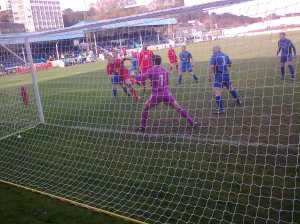
Following in my footsteps, our son has already displayed an interest in following the latest football scores…
I always look forward to the new football season and another year of following Bangor City in the Welsh Premier League. Since moving to North Wales, I’ve become a season ticket holder and active member of the Supporters’ Association. The new season that begins on Saturday will be the first since the birth of our son in April.
Even before he was born, my wife ordered a custom-made Bangor City baby grow via the internet that fits three to six month olds. As our son recently turned four months old just as the season is about to begin, this seems to have been a perfect choice! Even when our son was only a few weeks old, reading posts by other bloggers about things like taking their son to their first baseball match made me kind of excited about things to come.
I think that it’s important to add that if we’d had a girl rather than a boy, I’d have been just as keen to take them to football matches. For me, this is about sharing interests with one’s kids and encouraging them to take an interest in sport – both as something to watch and something to play.
If our son and any subsequent children decide that football isn’t their thing, it’s not going to be a disappointment to me, well at least not unless they end up joining the already large group of relatives on my side of the family who for some reason prefer rugby to proper football (…a clear sign of a mis-spent youth I feel!).
My own dad seems to prefer both cricket and rugby to football, but that didn’t stop him from taking me to a lot of football matches when I was growing up. This at times involved some quite long journeys across Scotland and demonstrated a sort of devoted and selfless parenting that I will have to work hard to emulate myself.
For me, learning about football has also been about learning about other countries as it has frequently overlapped with my interests in travel and languages. Indeed, donde puedo comprar un billete para el partido de futbol? is one of the phrases of my less than impressive Spanish vocabulaly that most easily rolls off my tongue.
I regularly watched football matches during the three years I spent living in France, my six years as a student in Leeds and this has continued since I moved to Wales in 2007. Getting to know a new area has at times been synonymous with getting to know some of the local football teams.
I have been lucky to attend football matches in a wide variety of other locations in Europe on my travels, including Barcelona, Malaga, Berlin, Helsinki and Rome. I’ve always enjoyed seeing how attending a match differs from one country to another and will never forget being part of an international group of French learners who won a fortnight-long trip to France for the 1998 World Cup.
Sport and national identity seem to be linked in both my professional and family life. I work as a university lecturer in French and have recently been doing some research about national identity and football in France. On a family level, I’ve thought about the fact that the places of birth of myself, my wife and our parents mean that our son would be eligible to play football for Wales, Scotland, England, Northern Ireland and the Republic of Ireland.
As some have suggested, our son may not turn out to be particularly good at football. In that case he’ll have to make do with the occasional call-up to the Scotland or Northern Ireland squad (…apologies to friends, family and readers from these parts!). Ultimately, I’m not bothered how good our son is at sport. As Michael Cusden suggested in a recent post on his blog Like a Dad, seeing one’s child having fun and trying to support them in doing so is much more important. I hope that as a parent I will manage to strike a balance between encouraging our son to enjoy sport rather than become the sort of overly vocal football dad that was described in a BBC News article last year.
Since becoming a dad, and even before, I’ve realised that my relationship with football has started to change. During the month leading up to my wife’s due date, I stopped going to away matches as I didn’t fancy embarking on a frantic dash home following news that our child was about to put in an appearance. In addition, my wife wasn’t all that impressed when I told her a true story I’d heard about a man who went out to a big football match just as his wife was starting labour and took her into hospital after he’d got back from the game.
For Bangor City, the new season kicks off with a game away to Newtown that would probably involve a five hour round trip from where I live. Despite the fact that it’s a place where myself and fellow Bangor City fans have always received a warm welcome from the locals, I won’t be there. As I work full-time during the week, this means spending quite a bit of time in my office rather than at home. For this reason, time with my wife and son at the weekends and evenings during the week is particularly valuable to me.
I don’t really think that missing a few football matches means that I am sacrificing something and I’m sure that a lot of dads (and mums) who are passionate about football and other sports would say the same.
Did your attitude to sport change after becoming a parent? If so, or if you’d like to share your thoughts on this post, please feel free to let me know in the comments section below. If you want to keep up with this blog, there are ‘Dad’s The Way I Like It’ pages on Facebook or Google+. Remember that you can also subscribe to this blog by entering your e-mail address in the box on the right of the screen.
 As a big fan of football, I look forward to sharing my passion for this sport with my son as he grows older. Despite not yet having reached his third birthday, he has already been to two football matches. Admittedly he slept through most of the first and didn’t seem too bothered about the second one.
As a big fan of football, I look forward to sharing my passion for this sport with my son as he grows older. Despite not yet having reached his third birthday, he has already been to two football matches. Admittedly he slept through most of the first and didn’t seem too bothered about the second one.

























